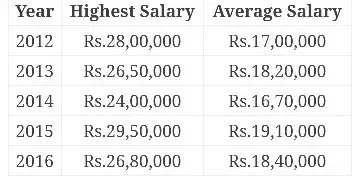Engineering is a sought-after profession globally, and India is no exception. With its booming tech industry and growing infrastructure projects, engineering offers promising career prospects. One crucial aspect that aspiring engineers often consider is the salary they can expect in this field. In this article, we delve into the intricacies of engineer salaries in India, shedding light on the factors influencing them and providing insights for both professionals and newcomers.
Understanding Engineer Salaries in India
The salary structure for engineers in India varies significantly depending on factors such as industry, experience, location, and specialization. While some engineering roles command lucrative salaries, others may offer more modest compensation packages. Let’s explore the typical salary ranges across different engineering disciplines in India:

Software Engineering
In India’s thriving IT sector, software engineers enjoy competitive salaries, with entry-level positions typically starting at around ₹25,000 to ₹50,000 per month. Experienced professionals with in-demand skills like cloud computing, artificial intelligence, and cybersecurity can earn upwards of ₹1 lakh per month or more, especially in metropolitan cities like Bengaluru, Hyderabad, and Pune.
Mechanical Engineering
Mechanical engineers play a crucial role in various industries, including manufacturing, automotive, and aerospace. Entry-level salaries for mechanical engineers typically range from ₹20,000 to ₹40,000 per month, with higher remuneration for those with specialized skills or experience.
Civil Engineering
Civil engineers are in demand due to infrastructure development projects across the country. Entry-level salaries for civil engineers start at around ₹25,000 to ₹35,000 per month, with opportunities for higher earnings as they gain experience and expertise in areas such as structural engineering, transportation, or urban planning.
Electrical Engineering
Electrical engineers work in diverse sectors, including power generation, electronics, and telecommunications. Entry-level salaries in this field generally range from ₹20,000 to ₹40,000 per month, with higher pay scales for roles requiring specialized knowledge in areas like renewable energy or power systems.
Factors Influencing Engineer Salaries
Several factors influence engineer salaries in India:
- Experience: Experienced engineers typically command higher salaries than fresh graduates.
- Location: Salaries vary significantly based on the cost of living and demand for engineers in different cities.
- Industry: Certain industries, such as IT and finance, offer higher salaries compared to others.
- Education and Skills: Advanced degrees, certifications, and specialized skills can lead to higher earning potential.
- Company Size and Reputation: Established companies or multinational corporations often offer more competitive salary packages than smaller firms.
Tips for Maximizing Engineer Salaries
Whether you’re a seasoned professional or just starting your engineering career, here are some tips for maximizing your earning potential:
- Continuous Learning: Stay updated with the latest technologies and trends in your field to remain competitive.
- Networking: Build a strong professional network to discover new opportunities and negotiate better salary offers.
- Certifications: Obtain relevant certifications to showcase your expertise and enhance your market value.
- Performance: Demonstrate your value to employers through high-quality work and contributions to projects.
- Salary Negotiation: Don’t hesitate to negotiate your salary offer based on your skills, experience, and market value.
Conclusion
Engineer salaries in India vary widely depending on factors such as industry, experience, location, and specialization. While certain engineering roles command lucrative salaries, others may offer more modest compensation packages. By understanding these factors and implementing strategies for career advancement, engineers can maximize their earning potential and build rewarding careers in India’s dynamic job market.



